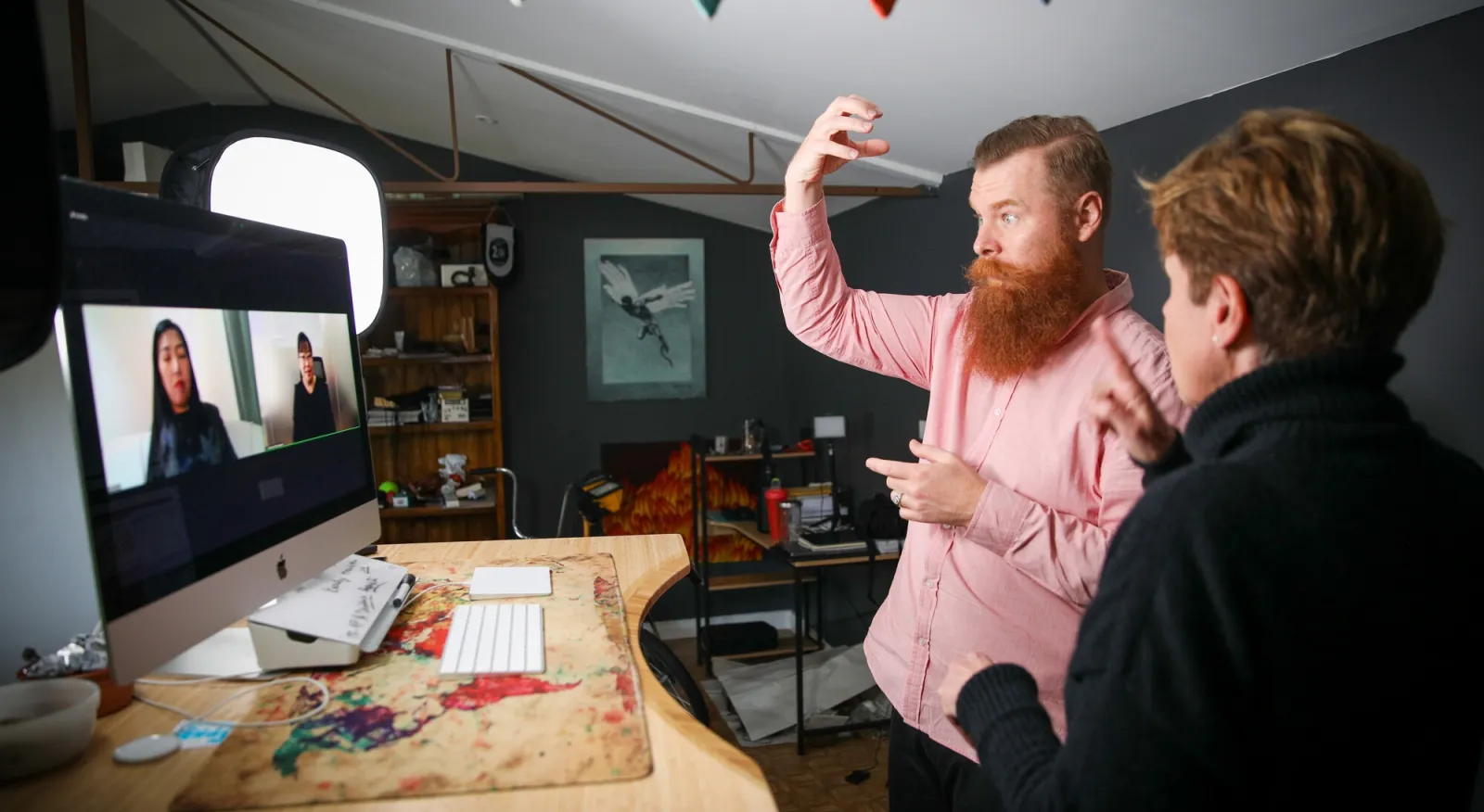'A wonderful collaboration’
Together with the Mongolian Association of Sign Language Interpreters, Australian volunteers Ramas and Rebecca are empowering sign language interpreters and the Deaf community in Mongolia.

Ramas McRae and Rebecca Ladd are a formidable team. Ramas, who is Deaf, and Rebecca, who is hearing, are sign language interpreters who have worked together for a number of years.
Over three years and three volunteer assignments, Rebecca and Ramas have worked with the Mongolian Association of Sign Language Interpreters (MASLI) to train sign language interpreter trainers, empower deaf leaders and advocate for Mongolian sign language to be officially recognised by the government.
The President and one of the founders of MASLI, Soyolmaa Lamjav, says Ramas and Rebecca’s contributions to the Mongolian Deaf community have been ‘remarkable’.
‘I truly appreciate both Ramas and Rebecca for committing to this process and for really taking into consideration the Mongolian situation... It has been a wonderful collaboration,’ she says.
'A key focus was sustainability’
Rebecca and Ramas heard about the Australian Volunteers Program while interpreting together in Canberra. They found an assignment with MASLI to support with training sign language interpreters and decided to apply together.
It is unusual for two people to jointly apply for an assignment - but MASLI and the program saw the opportunity in what the duo offered.
Ramas and Rebecca’s first assignment was all online. The main goal was to support MASLI in setting up a professional sign language interpreter training course – the first of its kind in Mongolia.
Rebecca and Ramas worked with the team to develop a local curriculum for sign language interpreters, based on their own experience and other countries’ curriculums. They then supported MASLI to train the deaf and hearing trainers who train the sign language interpreters, using this curriculum.
‘A key focus was sustainability,’ says Ramas. ‘We wanted to establish a system that was sustainable for (MASLI), where they were able to take the reins.’
'A big contribution to the Mongolian Deaf community’
Another central part of the assignment was supporting MASLI and the Mongolian Deaf community with its advocacy work to have Mongolian sign language recognised as an official language in the country. This is something that the Deaf community have been working towards since 2013.
During their first assignment Rebecca and Ramas met with MASLI’s sign language interpreter teachers every Monday on Zoom to develop the curriculum, lesson plans and the teachers’ skills.
Each Friday, the volunteers discussed the sign language legislation with members and leaders of the Mongolian Deaf community. Rebecca and Ramas did extensive research to find examples of other countries’ legislation to share with the group.
Soyolmaa says Ramas and Rebecca’s work in this space has made a ‘big contribution to the Mongolian Deaf community,’ as this research was largely inaccessible to MASLI.
'An amazing experience’
The following year Ramas and Rebecca spent two weeks in Mongolia with the team at MASLI, as part of a hybrid assignment.
Being in Ulaanbaatar gave the volunteers the opportunity to demonstrate a classroom environment for the interpreter trainers.
‘It was about modelling and leading the way for the Mongolian sign language interpreter trainers to see how deaf and hearing people can work together,’ says Ramas.
‘Every day (was) fully booked out - meeting lots of people, presentations, socialising,’ says Ramas. ‘When I got home, I was utterly worn out. But it was an amazing experience.’
‘I felt privileged to be able to enjoy their culture. What really struck me is deaf people’s lives (in Mongolia), and how they live each day and enjoy every moment.’
Being a role model
Soyolmaa says one of the biggest impacts of the volunteers being there was for the sign language interpreters and members of the Deaf community to meet Ramas in person.
‘Ramas as a sign language trainer and teacher and interpreter as well as being a Deaf person himself, was a real role model to Mongolian deaf people and (the) Deaf community.’
Rebecca agrees that Ramas clearly made an impact: ‘We had an opportunity to visit a deaf school and to see Ramas interacting with the deaf boys who were really into basketball. I think helped by the fact Ramas is very tall... all these little boys were looking up to him.’
With Ramas and Rebecca’s support, MASLI has pioneered systemic change by introducing a train-the-trainer program designed for deaf individuals aspiring to become sign language interpreter trainers. This model has the potential to be replicated in other countries where the program operates - something Rebecca and Ramas are in strong support of.
Key to the success of future projects is having people with disabilities involved, says Rebecca.
‘Don't underestimate the value of having people with lived experience involved in projects.’
The volunteers say being able to volunteer both remotely and in Mongolia is another crucial factor in the success of their collaboration with MASLI.
‘Having that hybrid (volunteering) model, doing it online and going in person was really effective,’ says Ramas.
Empowering Deaf women and girls
The volunteers also supported MASLI with successfully applying for a small grant from the program to support three deaf women and a sign language interpreter to attend the World Federation of the Deaf Congress and World Association of Sign Language Interpreters Conference in South Korea in 2023.
The four delegates then shared what they learned with 50 deaf women, sign language-interpreting students and interpreters through a series of workshops in Mongolia.
‘It was a privilege to have this grant, to extend the impact of the volunteers’ involvement to the Mongolian Deaf community as well as the deaf women and girls’ lives,’ says Soyolmaa.
Changing attitudes
Ramas says during their work with MASLI, he and Rebecca have seen a shift in attitudes towards deaf and hard of hearing people in Mongolia.
‘I have seen some of those adjustments in attitude and there have been one or two deaf people who have become leaders,’ he says.
‘Once we were there and we gave them positive empowerment, we told them, they can do it, it really opened their mind and shifted how they saw the world.’
Looking ahead
For their third assignment with MASLI, this time remotely, Rebecca and Ramas took more of a backseat. This assignment focused on supporting MASLI with some pilot testing to determine the level of sign language interpreters, as Mongolia does not yet have licensing or certification for interpreters.
The volunteers also provided leadership training to deaf and hearing Mongolian sign language interpreters, and supported MASLI to build a stronger partnership with the World Association of Sign Language Interpreters.
'We wanted (MASLI’s) systems, their empowerment, and their betterment to continue, for them to feel confident to sustain themselves,’ says Ramas.
‘And I'm happy to see where they're at, and I'm happy to be hands off and just check in every now and again.’
A rewarding experience
Rebecca says one of the most rewarding aspects of volunteering with MASLI has been working in a team with Ramas: ‘There’s no question about that,’ she says. ‘We were able to capitalise on each other’s skills.
‘I've been very privileged in the opportunities that I've had working with the Deaf community, and what I really want to see is the betterment of the Deaf community worldwide, so to be able to contribute to that in a small way is really rewarding,’ she adds.
‘But as someone who can hear, it’s important that the lead is taken by a deaf person.’
‘Give a busy person something and they get it done’
Both Ramas and Rebecca manage their volunteering commitments alongside many other aspects of their lives.
Ramas is a NAATI Deaf Interpreter and WFD-WASLI Accredited International Sign Interpreter and he’s studying for his PhD.
‘I’ve got my son, I’m studying for my PhD, I work as an interpreter, and I'm volunteering. It is a juggle, but I want to do it all!’ says Ramas.
‘Give a busy person something and they get it done,’ says Rebecca. ‘I’ve got a number of things on the go at the same time; it's a balancing act.'
Meet the team at MASLI
The amazing team at the Mongolian Association of Sign Language Interpreters shows us where and how they work in this short reel.
